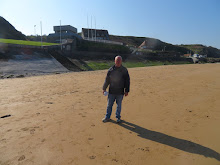I read thirteen books this year. Many were about the run-up to World War I, because I believe as the world currently re-arms and separates into warring camps, history is repeating itself a century later. I read several World War II histories, all battle histories, because I went to Normandy this year to visit the five D-Day beaches, perhaps the greatest military enterprise that was successfully (albeit with a frightenly slender margin for success) in world history. It literally changed world history. I believe that the short era of peace between the two world wars was merely an interregnum in a greater clash between governmental models, authoritative or liberal, and really, World War II was merely a continuation and the conclusion to World War I; and perhaps later history, if mankind survives this century, will treat the two great wars as one continuing worldwide war, sort of like the Hundred Years or the Thirty Years War.
Other than bellicose books pointing us towards our perhaps immediate future, I read a novel (literature), a play, and a antebellum civil war book--all had a political bent that point towards American peculiarities that have forged us as a world power, racism (slavery) and the power of propaganda and misspeak. Plus a couple of other books of interest to me.
Here are the top ten books I read this year in my estimation, in the order of how much they caused me to contemplate, deeply or otherwise. Several were scintillating to me (page turners) and others were a slog to get through.
1. The Fires of Jubilee--Nat Turner's Fierce Rebellion by Stephen Oates (1975). Terrorist or Freedom Fighter?
2. Castles of Steel--Britain, Germany and the Winning of the Great War at Sea by Robert Massie (2003). This I considered to be a scintillating book (832 pages), especially the you-are-there lerngthy description of the Battle of Jutland, describing naval gunfire practically salvo by salvo.
3. Animal Farm by George Orwell (1946). Who could ever forget the image of stalwart, loyal Boxer being sent off to the glue factory by Napoleon when his usefulness was over as the other "free" animals watched helplessly in despair?
4. Inherit the Wind by Jerome Lawrence and Robert E. Lee (1955). The Scopes Trial in play-form (see: American racism).
5. Dreadnought--Britain, Germany and the Coming of the Great War by Robert Massie (1991). The steady drumbeat to a great war--especially chronicling the incompetent egotistical boob that was the Kaiser; the quoted foreign embassy dispatches often describe what a ridiculous strutting cock he was, shallow and a complete hindrance to old-style statesmanship and steady progress towards peaceful solutions--remind you of anyone constantly in the headlines currently?
6. Unbroken by Laura Hillenbrand (2010). The Louis Zamperini story of perseverance, survival and redemption, a true story set amidst the destruction and cruelty of World War II.
7. D-Day, the Battle for Normandy by Anthony Beever (2009). Apparently there are a few inaccuracies in this book but it provides an overview of the Allied assault upon Hitler's Fortress Europa and the 3-month slugging match between the Wehrmact and the Americans, British and Canadian forces before breakout in the Coentin Peninsula that followed the lodgment effected on June 6, 1944.
8. The Wehrmact's Last Stand--The German Campaigns of 1944-1945 by Robert M. Citino (2017). Like the Lost Cause, tough men fanatically defending a reprehensible regime.
9. Power at Sea--The Age of Navalism, 1890-1918 by Like A. Rose (2008). Two empires decline (France and Britain), several empires are vanquished (Austria-Hungary, the Ottoman Empire, and the German Empire for two decades), an empire is spawned (Japan), and an empire emerges (America).
10. The First World War by Hew Strachan (2003, 2013). World War I is an introduction to World War II and a presage to current times.
Monday, December 30, 2019
Subscribe to:
Post Comments (Atom)

No comments:
Post a Comment